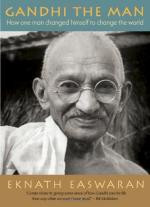
|
| Name: _________________________ | Period: ___________________ |
This test consists of 15 multiple choice questions and 5 short answer questions.
Multiple Choice Questions
1. He also explained his commitment to truth and non-violence, saying that whatever the penalty for his crime, he was ready to take it, if what?
(a) The jury did not sentence him to death.
(b) The jury believed he was guilty of breaking the law.
(c) The jury truly believed that their system existed for the good of the people.
(d) The jury would pray for him.
2. How successful was Gandhi in Bombay?
(a) He did not practice law in Bombay.
(b) Not very successful.
(c) Very successful.
(d) Somewhat successful.
3. How many years from that day did Gandhi's determination blossom into inspiration to organize his first mass non-violent resistance?
(a) Four.
(b) Eight.
(c) Ten.
(d) Thirteen.
4. Gandhi found himself a solitary apartment and began by doing what?
(a) Decorating it.
(b) Looking for a roommate.
(c) Hosting parties.
(d) Modeling himself after a fellow student whose poverty dictated that he cook his own meals and walk instead of paying for transportation.
5. From that moment, Easwaran's lifelong dedication to ______________ took on a new life as he strove to embody the principals of the Bhagavad Gita in the same way he had seen them made real in the person of Gandhi.
(a) Love.
(b) Peaceful living.
(c) His family.
(d) Meditation.
6. Gandhi acted out of compassion for both the British and the Indians for what reason?
(a) He was both British and Indian.
(b) To point out the flaws in their system.
(c) He loved both the British and Indian ideals.
(d) To point out how valuable both systems were.
7. Gandhi sulked in his homesickness until when?
(a) A fellow Indian told him to go back home.
(b) A fellow Indian pointed out that the best things to be learned in England were English customs.
(c) A British student told him to go back home.
(d) A British student pointed out that the thing to be learne in England was English custom.
8. The police reaction to the Indian response was what?
(a) Minor.
(b) Instant and violent.
(c) Peaceful.
(d) Weak.
9. How does Gandhi plan on taking the lessons from the failures of his past?
(a) To stay away from anything that could cause failure.
(b) To not run from failure again.
(c) Be proud of his accomplishments and to forget his failures.
(d) To think of his family first.
10. Michael N. Nagler of the University of California, Berkley provides the forward for the book, and opens by asking the reader what?
(a) To consider whether Gandhi is a good example to follow.
(b) To consider whether Gandhi helped others.
(c) To consider whether Gandhi was a great man.
(d) To consider whether Gandhi might be the most significant historical figure of the 20th century.
11. Weeks of more protest followed, as did hundreds more arrests, culminating at last with what?
(a) Kasturbai's arrest.
(b) Gandhi's death.
(c) Gandhi's arrest.
(d) The end to the protest.
12. What did Gandhi's uncle suggest he do?
(a) Go to England to find work.
(b) Go to England to study religion.
(c) Go to England to study law.
(d) Go to England to study medicine.
13. Britain had forbidden Indians to gather their own salt, requiring instead that they buy it at a premium from British sources. So, on Gandhi's signal, all of India would simply walk to the ocean and pick up the salt that laid there for the taking and buy and sell it locally from each other, as if the law had never been enacted. What was this called?
(a) The Salt Collection of 1925.
(b) The Salt Satyagraha of 1930.
(c) The Salt Selling of 1920.
(d) The Salt Wars of 1935.
14. To whom was Gandhi deeply devoted?
(a) His family.
(b) His friends.
(c) His culture.
(d) His education.
15. Following a period of complete submission to all of the nuances of English dress and society, Gandhi concluded that the practice was doing what to him?
(a) Making him wish he were not Indian.
(b) Making him more friends.
(c) Making him feel more at home.
(d) Making him more self conscious and costing him more money.
Short Answer Questions
1. In the first chapter, Easwaran describes the contrast between Gandhi as a youth to what?
2. What did Gandhi call the new form of resistance?
3. The author comes from Gandhi's home and ethos, and sees the world from a perspective very like Gandhi's instead of through what?
4. He went into beautiful temples and told the people what?
5. When his rebellion brought Gandhi into the presence of the leader of the Transvaal government himself, what did Gandhi do?
|
This section contains 817 words (approx. 3 pages at 300 words per page) |

|




